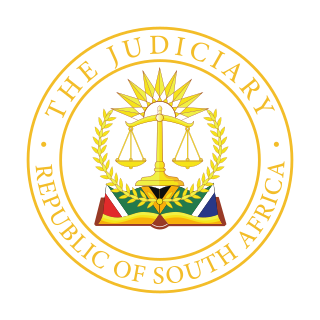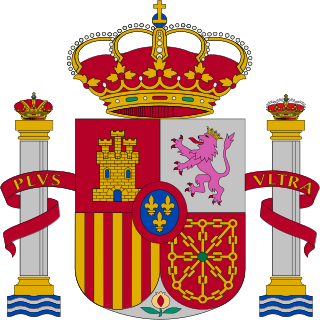
The Government of Barbados (GoB) is a unitary parliamentary republic, where the President of Barbados is the head of state and the Prime Minister of Barbados is the head of government.

The Judiciary of Russia interprets and applies the law of Russia. It is defined under the Constitution and law with a hierarchical structure with the Constitutional Court and Supreme Court at the apex. The district courts are the primary criminal trial courts, and the regional courts are the primary appellate courts. The judiciary is governed by the All-Russian Congress of Judges and its Council of Judges, and its management is aided by the Judicial Department of the Supreme Court, the Higher Qualification Board of Judges, and the Ministry of Justice, and the various courts' presidents. And although there are many officers of the court, including jurors, the Prosecutor General remains the most powerful component of the Russian judicial system.

The High Court of Singapore is the lower division of the Supreme Court of Singapore, the upper division being the Court of Appeal. The High Court consists of the chief justice and the judges of the High Court. Judicial Commissioners are often appointed to assist with the Court's caseload. There are two specialist commercial courts, the Admiralty Court and the Intellectual Property Court, and a number of judges are designated to hear arbitration-related matters. In 2015, the Singapore International Commercial Court was established as part of the Supreme Court of Singapore, and is a division of the High Court. The other divisions of the high court are the General Division, the Appellate Division, and the Family Division. The seat of the High Court is the Supreme Court Building.

The judiciary of South Africa is the body of judges and magistrates who sit in the courts of South Africa. The judiciary is an independent branch of the government, subject only to the Constitution of South Africa and the laws of the country. The Judiciary interprets the law of South Africa, using as the basis of its interpretation the laws enacted by the South African Parliament as well as explanatory statements made in the legislature during the enactment.
In Greece, the Special Highest Court, is provided for in the article 100 of the Constitution of Greece. It is not a permanent court and it sits only when a case belonging to its special competence arises. It is regarded as the supreme "constitutional" and "electoral" court of Greece. Its decisions are irrevocable and binding for all the courts, including the Supreme Courts. However, the Special Highest Court does not have an hierarchical relation with the three Supreme Courts. It is not considered higher than these courts and it does not belong to any branch of the Greek justice system.

In most legal jurisdictions, a supreme court, also known as a court of last resort, apex court, and highcourt of appeal, and court of final appeal, is the highest court within the hierarchy of courts. Broadly speaking, the decisions of a supreme court are binding on all other courts in a nation and are not subject to further review by any other court. Supreme courts typically function primarily as appellate courts, hearing appeals from decisions of lower trial courts, or from intermediate-level appellate courts. A supreme court can also, in certain circumstances, act as a court of original jurisdiction.

The judiciary of Pakistan is the national system of courts that maintains the law and order in the Islamic Republic of Pakistan. Pakistan uses a common law system, which was introduced during the colonial era, influenced by local medieval judicial systems based on religious and cultural practices. The Constitution of Pakistan lays down the fundamentals and working of the Pakistani judiciary.

The judiciary of Portugal is a system of courts that together constitute one of the four organs of Sovereignty as defined by the Portuguese Constitution. The courts are independent from the other three Portuguese organs of Sovereignty.

The Supreme Court is the highest court in the Kingdom of Spain. The court has original jurisdiction over cases against high-ranking officials of the Kingdom and over cases regarding the legalization of political parties. It also has ultimate appellate jurisdiction over all cases. The Court has the power of judicial review, except for the judicial revision on constitutional matters, reserved to the Constitutional Court.

The Judiciary of the Czech Republic is set out in the Constitution, which defines courts as independent institutions within the constitutional framework of checks and balances.

The Judiciary of Spain consists of Courts and Tribunals, composed of judges and magistrates (Justices), who have the power to administer justice in the name of the King of Spain.

The judiciary of Italy is composed of courts and public prosecutor offices responsible for the administration of justice in the Italian Republic. These offices are occupied by judges and prosecutors respectively, who are known as magistrates. Magistrates belong to the magistracy, that is to say a branch of the State that may only be accessed by Italian citizens who hold an Italian Juris Doctor and successfully partake in one of the relevant competitive public examinations organised by the Ministry of justice.

The Supreme Court of Nauru was the highest court in the judicial system of the Republic of Nauru until the establishment of the Nauruan Court of Appeal in 2018.
The Federal Government of Brazil is the national government of the Federative Republic of Brazil, a republic in South America divided into 26 states and a federal district. The Brazilian federal government is divided into three branches: the executive, which is headed by the President and the cabinet; the legislative, whose powers are vested by the Constitution in the National Congress; and the judiciary, whose powers are vested in nine organs, including the Supreme Federal Court and lower federal courts. The seat of the federal government is located in Brasília.
The Judiciary of Kosovo is the collection of the central Kosovo institutions that exercises judicial authority in Kosovo. According to the 2008 Constitution of Kosovo, the judicial system is composed of the Supreme Court and subordinate courts, a Constitutional Court, and an independent prosecutorial institution. The courts are administered by the Kosovo Judicial Council.

The Judiciary of Sierra Leone is the branch of the Government of the Republic of Sierra Leone which interprets and applies the laws of Sierra Leone to ensure impartial justice under law and to provide a mechanism for dispute resolution. The independence of the judiciary is guaranteed by the constitution.

The Supreme Court of the Dominican Republic is the highest court existing in the Republic and is, therefore, the head of the judiciary in the country.

The High Council of the Judiciary is an Italian institution of constitutional importance, entrusted to preside over the organisation of the Italian Judiciary. The High Council sits in the Palazzo dei Marescialli, Piazza Indipendenza 6, Rome.
The Judiciary of Azerbaijan exercises judicial power in Azerbaijan. Although the Azerbaijan constitution nominally guarantees judicial independence, the executive firmly controls prosecutors and judges. Judges and prosecutors collaborate in Azerbaijan to repress political opponents.

The Judiciary of Mexico, officially the Judicial Power of the Federation, is one of the three branches of government in Mexico, and the sole federal judiciary power. It is composed of the Supreme Court of Justice of the Nation, which serves as its highest court, the Federal Judiciary Council, the Federal Electoral Tribunal, regional courts, circuit and appellate collegiate courts, and district courts. In October 2024, Mexico became the only legal system in the world where its judges would be elected by popular vote.
















